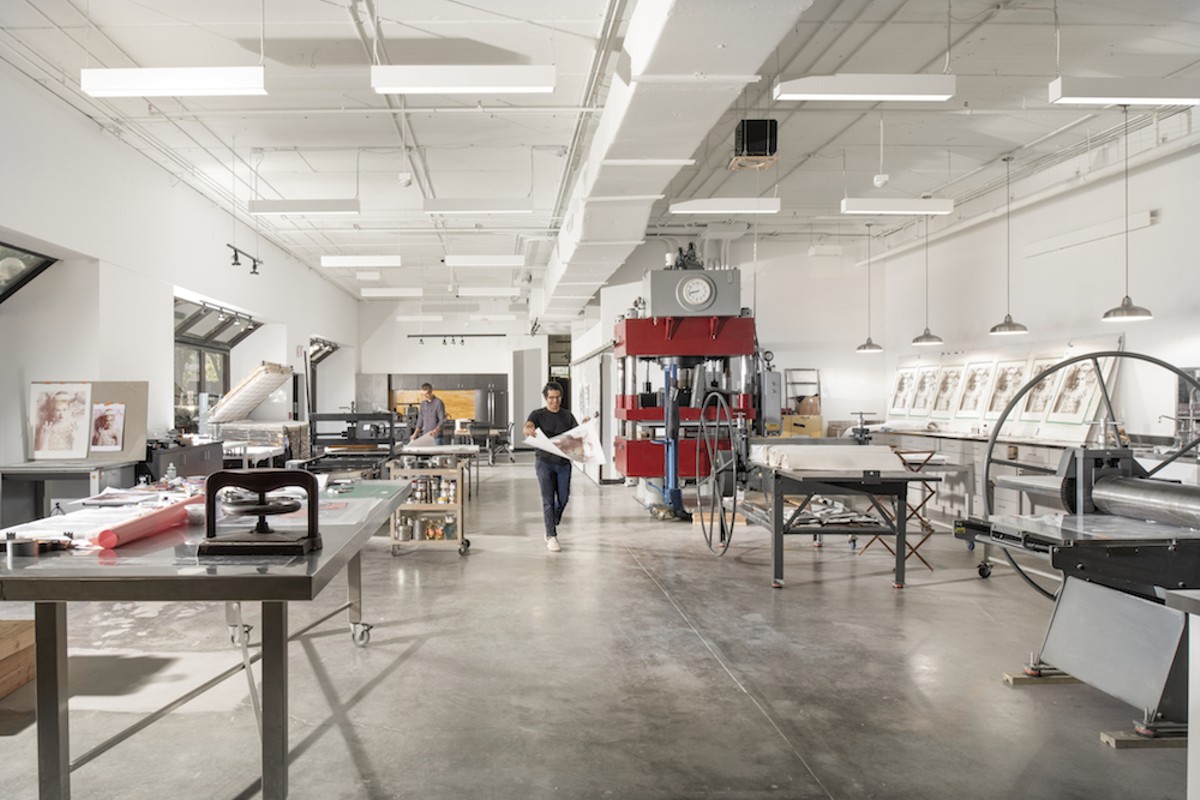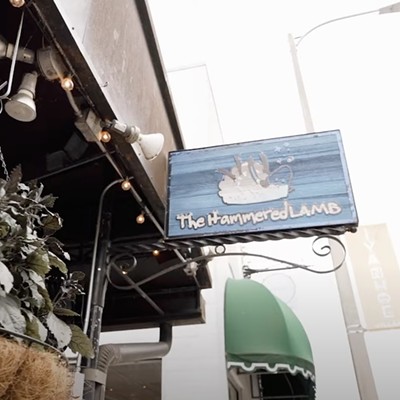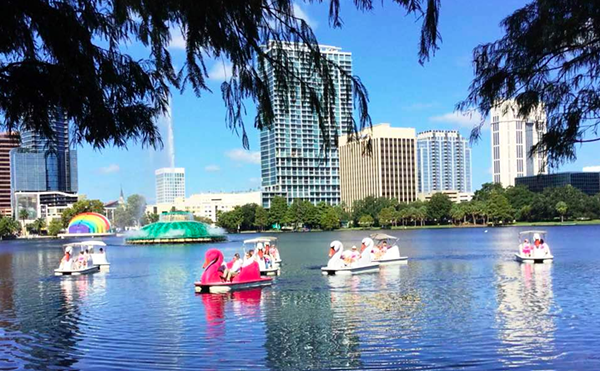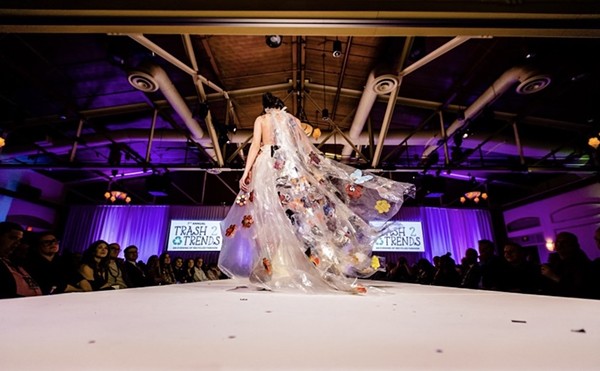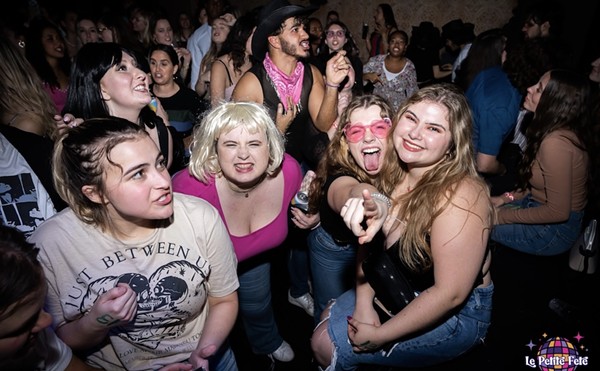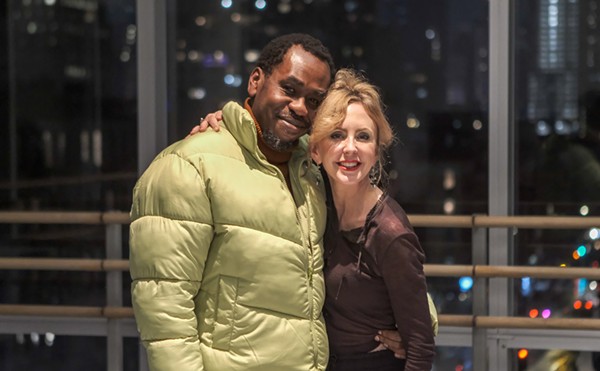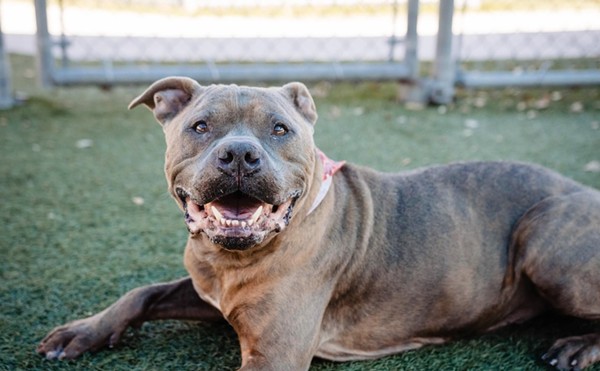Downtown Orlando hums with restaurants and bars and a nice artsy vibe, with residential towers popping up all around. There is one swath of downtown which might be mistaken for 1945 Berlin, but that's just our very own I-4 Ultimate Project, folks – and it's worth it to wade through the rubble to see what's on the other side. Indeed, there is something to see: In March, Flying Horse Editions moved out of the innards of the UCF Center for Digital Media, opening a sidewalk location on Amelia Street just west of I-4. Suddenly the university's presence downtown is real.
"We like it here and look forward to settling in," director Theo Lotz says as he gives Orlando Weekly a tour of the new space. "We are open to the public. We don't get a lot of visitors, which is fine because we have a small staff."
Flying Horse Editions is the printmaking studio arm of the UCF College of Visual Arts. To reach it from the Lynx Station, follow Amelia Street, emerging on a beautifully oak-shaded sidewalk fronted by the neobrutalist Centroplex Garage. Flying Horse Editions occupies this storefront space, a surprising oasis of calm in the city's sizzling energy. In the large windows along the sidewalk, Lotz showcases his studio's gallery and press under the trees' shadowy canopy.
When UCF's Center for Digital Media expanded, Lotz took the chance to consolidate a rather haphazard warren of studios and offices. The university is growing its presence downtown, and Flying Horse is growing as well. Now, unified into a single space, Flying Horse is able to crystallize its identity.
"We're a collaborative research studio," Lotz explains. Flying Horse invites artists to create limited-edition prints, books and other objects, and pairs them with UCF student assistants who operate the presses and otherwise help with the production of art.
"Will Cotton sat there," Lotz gestures at a table in the window, recounting one of the well-known painter's visits to Flying Horse. "As he sketched, a guy started coming by daily on the sidewalk, peering in. Cotton would hold up his sketch and the guy would give it a thumbs-up or clap."
The clean, open studio lends itself to all sorts of collaborative creativity and Lotz, as the director, encourages more. "We like to help artists push themselves and their work into experimental places," he says.
Alex Dodge, based in Brooklyn, New York, is one such artist. With a practice that encompasses 3D modeling and computer-generated imagery ideas, Dodge came to Flying Horse and stepped out of his usual boundaries, producing a series of gorgeously embossed sheet-aluminum prints, surrealistic images of crumpled dollar bills and gift-wrap.
"He pushed us all. We learned a lot about aluminum alloys," Lotz chuckles. Some of the work hangs in the press' front gallery, visible from the street.
Huge cast-iron presses inhabit the studio. Their mirror-finish drums contrast with the blackened ironmongery of curved struts, wheels and levers reeking of the Mechanical Age of print. In the rear, a hydraulic press the size of a fire truck occupies a corner. Alongside sit light tables, a darkroom and lithography stones – "In fact, we have a lithography stone from Bavaria, one of the last ones left of this large size," Lotz brags – and a book press sits in the lobby, which Lotz assures us is fully functional.
The studio is so new it hasn't acquired the kind of messy, layer-over-layer feeling of being lived-in ... yet. Flying Horse Editions is one of the few working art presses still in existence. Through a passionate following of collectors, it thrives by putting out a series of limited runs for subscribers each year. It puts the lie to any rumor that print is dead. Print is very much alive, here and now, in this space.
As is this corner of the city, with UCF's new campus settling in. It's not just the mix of students and businesspeople, or the mix of late-evening campus activity within the 9-to-5 bustle. It's the potential that UCF brings to downtown Orlando: a student culture enriching the atmosphere like Stetson does for DeLand, NYU does for the Village, or the University of California does for Berkeley. The time-machine effect of students and artists working on these magnificent, muscular printmaking machines in our contemporary city is something unique in Orlando, and suggests a change in our city for the better.

